TUM Think Tank
Where today's societal challenges meet tomorrow's technological excellence.
Quantum technologies will potentially transform whole industries, create new markets, and push the boundaries of our imagination. These transformations will include new, highly secure, and fast ways of communication and powerful quantum computers that can solve problems we currently cannot solve because of the computational limits of today's supercomputers.
However, with these revolutionary technologies come new challenges for society. The Quantum Social Lab's mission is to research the societal, ethical, political, and legal challenges of tomorrow's quantum world.
To tackle these questions, we count on interdisciplinary and highly motivated teams and future generations. To accomplish this mission, we created a scholarship program, the Young Quantum Social Scientists, a collaboration between the TUM Think Tank and the QuantWorld Project. Each cohort consists of up to 20 students who can put their theoretical knowledge to use by addressing real-world problems.
Out of over 50 applications from study programs all over Munich's universities, we chose six of the brightest minds. Our first cohort of Young Quantum Social Scientists originates from six different nations, pursuing studies in various fields from Psychology, Politics, and Technology to Biomedical Engineering and Medical Physics!
We are pleased to introduce our incredibly talented first cohort of Young Quantum Social Scientists.
Alexander Orlov
Alexander Orlov is a double degree student of Quantum Science and Technology (M.Sc. at TUM/LMU) and Political Science (B.Sc. at TUM). He is particularly interested in translating cutting-edge scientific findings into actionable and socially beneficial insights.

Why did you become a YQSS?
Quantum Technologies have the potential to have a profound impact on our society. I joined the YQSS program to learn how we can initiate responsible quantum innovation and ensure a globally positive impact of quantum tech. Plus, the societal perspective is a super valuable add-on to the technical point of view from my university studies.
Favorite part of being a YQSS
I really enjoy working together with my fellow YQSS. We come from different study backgrounds, but we share the fascination for quantum tech and the commitment to make a difference.
Something interesting or valuable you have learned so far
We have been involved in several events already, with partners from business, politics and research. It is really interesting how differently these groups think about and approach quantum technologies.
Eden Castaneira Rios
Eden Castaneira Rios has studied Actuarial Science and is now pursuing a master’s degree in Politics and Technology. He is interdisciplinary and implementation driven and has deep experience and interest in pairing up society, politics, business and technology.

Why did you become a YQSS?
I became a YQSS because I am passionate about showcasing and driving innovative developments that make use of quantum science as enablers of the greater good. I am interested in building useful interdisciplinary frameworks and addressing societal questions to enable the development of responsible, efficient, and implementable quantum technologies.
Favorite part of being a YQSS
The program has such a great and talented team, the work is fun, challenging but also useful!
Something interesting or valuable you have learned so far
Quantum technologies are as unstable as life gets, so we should not be scared about it. We are already living under its rules.
Ekin Arslan
Ekin Arslan is a Master's student in psychology focused on learning sciences. He is passionate about understanding the human mind and values teamwork and communication. His interests span psychology, technology, and politics, aiming to enhance organizational achievement and explore the impact of psychology on quantum technologies and policies.

Why did you become a YQSS?
I became a YQSS to explore other research areas rather than psychology, but at the same time use my knowledge to a field unknown.
Favorite part of being a YQSS
My favorite part of working at YQSS is being part of such an incredible team; the friendliness, support, and shared passion for our work make every day both enjoyable and fulfilling.
Something interesting or valuable you have learned so far
Working at YQSS has significantly enhanced my understanding of quantum policies and their transformative impact on technology and society. This experience has also provided valuable insights into the psychological effects of these advancements, highlighting how they can redefine social structures, especially broadening my views on how to look at the world as a psychologist.
Jerry Miller
Hailing from Canada, Jerry Miller is a Master of Politics and Technology student at the Technical University of Munich, specializing in Data & Society. He is fascinated by all things technology and how innovation can reshape political landscapes.
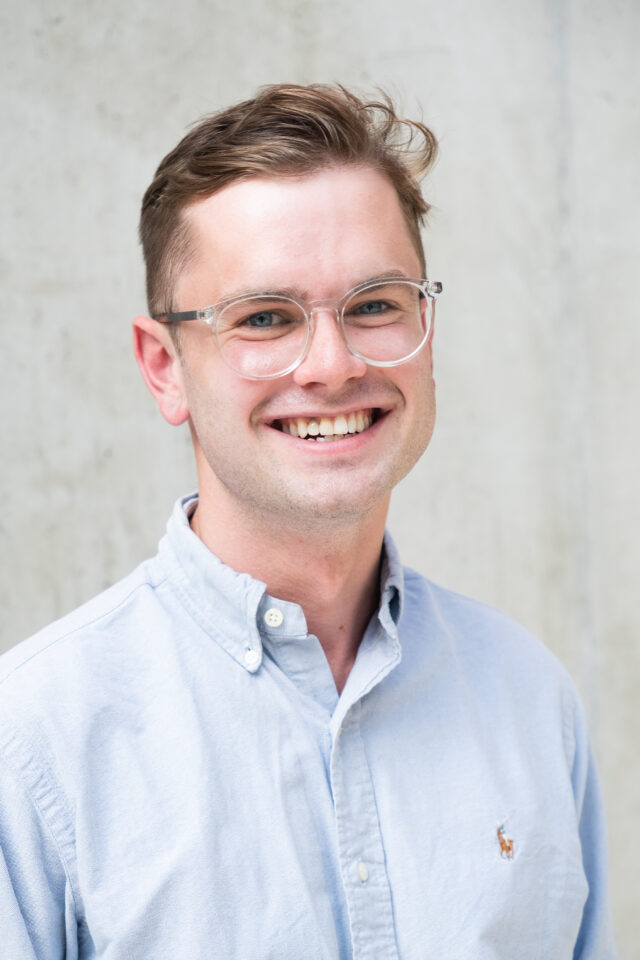
Why did you become a YQSS?
I joined the YQSS to explore the profound societal and ethical implications of second generation (and beyond!) quantum technologies. I aim to contribute to informed policy-making decisions and help shape public understanding of quantum technologies.
Favorite part of being a YQSS
The best part of joining the Young Quantum Social Scientists is the team: I have an incredible time learning from my fellow students and I always feel supported by the lab's leadership in continuing my learning journey.
Something interesting or valuable you have learned so far
There are no easy answers in the quantum world.
Nuria Quesada Perez
Nuria Quesada Perez is currently studying Biomedical Engineering and Medical Physics at the TUM. She has always been passionate about research in the medical field but she also enjoys learning about completely unrelated study areas. She is an active and curious person, always looking forward to getting to know new people and hobbies.

Why did you become a YQSS?
Quantum mechanics has always been a background topic throughout my studies, but I have never been actually involved in its world. Moreover, I have never had the opportunity to participate in anything related to political sciences. Being a YQSS has brought me the opportunity to combine these two interesting fields and be part of an interdisciplinary project in which people with different backgrounds help me extend my knowledge while having a joyful experience.
Favorite part of being a YQSS
I really enjoy spending time with the team and we are offered a broad range of opportunities to take part in events and seminars that I wouldn't be aware of if I wasn't a YQSS.
Something interesting or valuable you have learned so far
Basics of Quantum Technology, the impact that Quantum technologies are having nowadays and the consequent technological evolution that is needed, how to coordinate different teams within the same project, etc.
Rowan Crawford
Rowan Crawford is a Political Science student at the Technical University of Munich. He works as a student research assistant at the TUM School of Governance and the TUM School of Management. He is particularly interested in the development and governance of emerging technologies and economic and global justice.
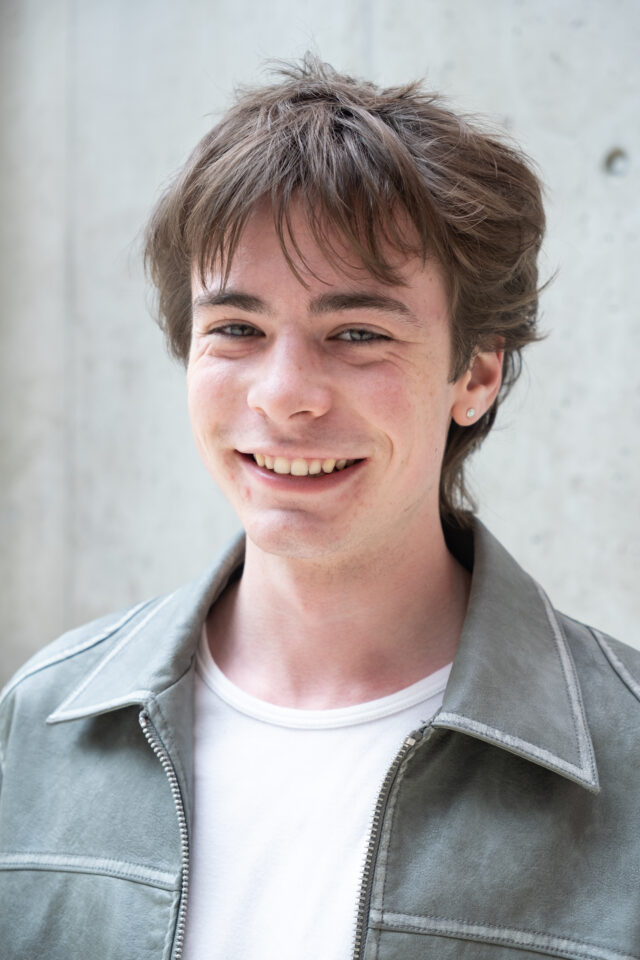
Why did you become a YQSS?
I joined the YQSS to work at the intersection of emerging technologies and governance. I am fascinated by quantum technologies and believe their development has massive transformative implications for science, economy, and society. As a member of the YQSS, I can research this interdisciplinary and cutting-edge field as it unfolds "in real-time."
Favorite part of being a YQSS
My favorite part of being a YQSS is working with and observing some of the brightest minds in quantum technology, economy, and social sciences. I am grateful to be a part of such an impressive research network.
Something interesting or valuable you have learned so far
During my time as a YQSS, I have been able to improve my stakeholder management skills, especially in a research context.
Are you curious to become a Young Quantum Social Scientist yourself?
Stay tuned as our new application phase for the scholarship program is starting soon!
How can we pave the way for a bright quantum future?
Last Thursday, PushQuantum started its semester program in collaboration with the Quantum Social Lab. We were pleased to welcome Ilyas Khan to the TUM Think Tank for this special day. The Founder and CPO of Quantinuum did not only join a panel discussion but also spent some quality time with the student’s club members.
One event highlight was the panel discussion, which centered around the future of quantum technologies. Ilyas Khan was joined by Robert Wille, professor at TU Munich and Chief Scientific Officer at the Software Competence Center Hagenberg, and Fabienne Marco, Head of the Quantum Social Lab and Project Lead of QuantWorld.
The panelists shared their perspectives on the future of quantum technologies, drawing from their diverse backgrounds spanning from the quantum computing industry over mathematics and political science to software development.
The panel moderator, Alexander Orlov (PushQuantum), challenged our panelists with questions ranging from the anticipated advancements and major challenges in quantum computing, including education and policy making, to personal experiences. In addition, he elicited rare advice from the panelists on how to accelerate the students’ careers in quantum technology-related fields in an impactful way.
Key takeaways included the importance of learning from past mistakes, finding suitable approaches for education within quantum technologies (and specifically quantum computing), and the need for interdisciplinary work in the field of quantum technology.
When asked about the future of quantum and what will be the crucial factor within further and fast development, Ilyas Khan suggested shifting the focus from coherence times to entropy. ‘I would say that of all the things that matter in the context of possible advantage, I’d encourage you to think of cross-entropy because it can be validated or not. [...] And I think this year, we will incontrovertibly pass that threshold. There is zero question in my mind.’
Talking about education and future talents, the ‘current challenge lies in matching the needs for different parts of the society and a more holistic and interdisciplinary approach within education,’ according to Fabienne Marco.
A common position the panelists had was the importance of changing the narrative within the media from fear to the opportunities connected with quantum technology.
Robert Wille pointed out how important it is to distinguish who is best equipped to solve different challenges: ‘When it comes to quantum computing software, computer scientists have to lead the way.’ Drawing from his personal experience, he also emphasized the importance of sometimes challenging yourself by entering new scientific bubbles to share solutions and avoid reinventing existing solutions in other disciplines.
Thanks to all the panelists for the insightful discussion!
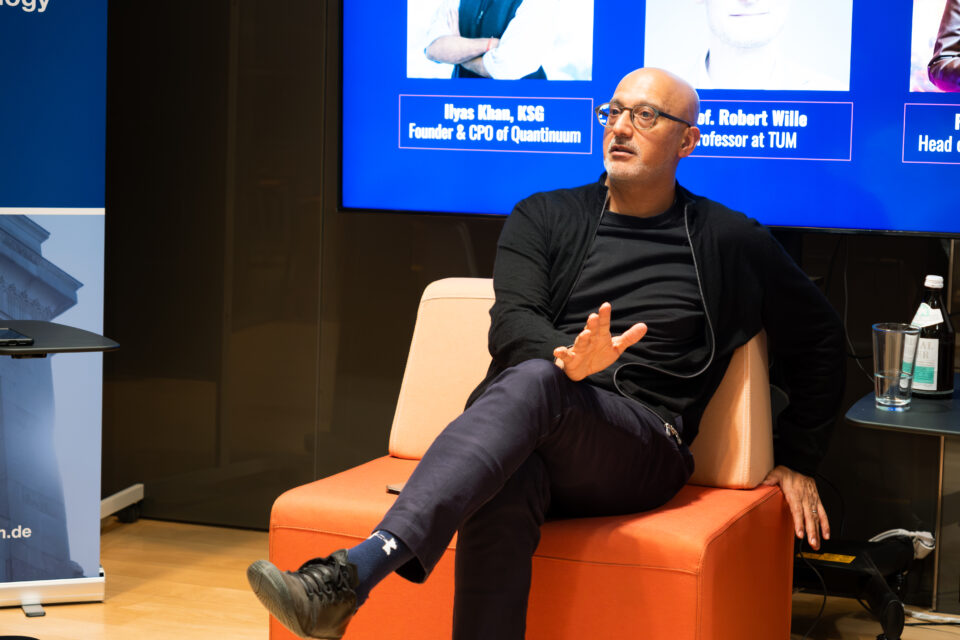
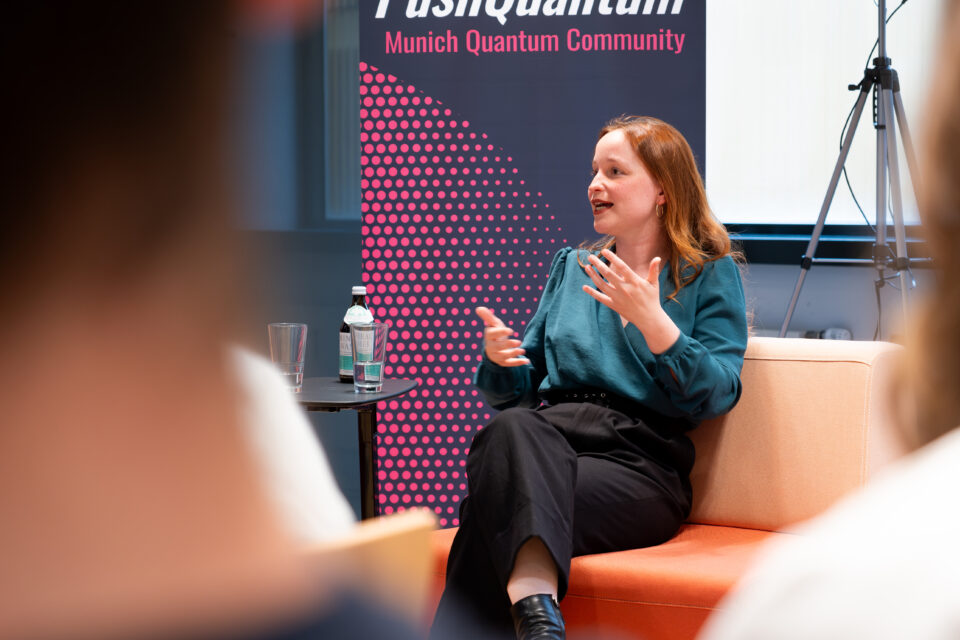

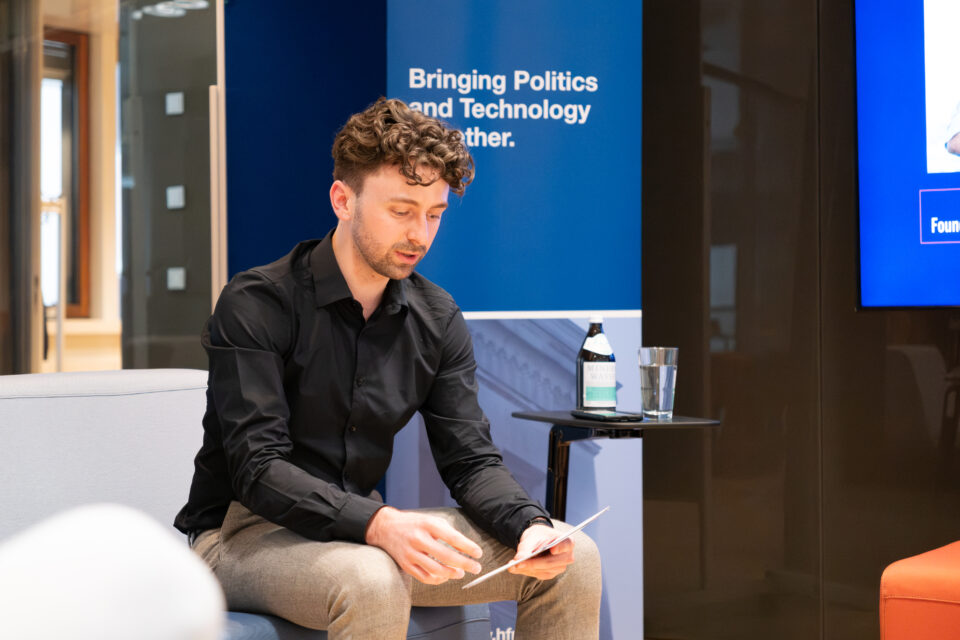
PushQuantum is a Munich-based student club which offers real world-focused education in quantum tech. Within TUM Think Tank's Public Policy Impact Program, PushQuantum focuses on actively contributing to shaping a responsible quantum future - a vision shared with the Quantum Social Lab.
Are you a passionate informatics student eager to contribute to an innovative learning platform? The Quantum Social Lab is looking for informatics students to do their interdisciplinary project (IDP) within our flagship project QuantWorld.
About the project
The aim of the project is to impart knowledge of quantum technologies 2.0 to target groups and to make them tangible. For this purpose, the module-based QuantWorld learning platform with certification options meets people in their respective living and working environments. The focus is on the living environments of mobility, banking and medicine.
In this project you work on the following topics:
- Create a digital learning platform for QuantWorld
- Integrate interactive modules into the digital learning platform
- Support on the creation of the QuantWorld website
- Create interactive presentation materials on the topic of quantum technology
- Cut science videos for the learning platform
- You are always welcome to contribute your ideas to the project!
Your benefits
- Integration in a interdisciplinary team of IDP students at TUM Think Tank.
- Build a network in an expert environment.
- Exchange ideas with various experts from the field of art, politics, architecture, physics,
games engineering and data science. - Better chances on the job market: After submitting your thesis or project work, you will
receive a reference certificate if required
More information
- ECTS credits, e.g. as part of a a compulsory or research internship.
- Opportunity to write thesis with TUM Think Tank.
- Work can be done from a remote position if required
- Start is flexible.
- The duration of work is flexible: but there a fixed dates.
- Voluntary participation in various workshops and lectures as part of the QuantWorld project
- Co-working in the heart of Munich with unlimited supply of coffee (personal use only)
Requirements
- Interest in the topic of quantum technology
- Good knowledge of programming websites (in particular wordpress), digital learning platforms and digital modules
- Intermediate knowledge or interest in cutting programs as Adobe Premiere
- Team player skills
- High motivation and independent way of working, proactive and self-organized
Interested in becoming part of the QuantWorld-project?
For questions and registration, please contact Alisha Ogidan.
Quantum technologies can potentially reshape our society, for better or worse. For instance, quantum simulations could play a pivotal role in combating climate change, yet they could also be exploited to develop chemical weapons. How can we ensure that our society benefits from quantum technologies while mitigating potential risks?
In a commenary titled "A call for responsible quantum technology," published today in Nature Physics, Urs Gasser of the Quantum Social Lab at the TUM Think Tank, along with co-authors Eline De Jong and Mauritz Kop, advocate for the responsible handling of quantum technologies and the establishment of guidelines. Based on an international interdisciplinary effort led by the Stanford Center for Responsible Quantum Technology, the authors introduce a framework for responsible quantum technologies that integrates ethical, legal, socio-ecological, and policy implications into the research and development of quantum technologies.
Developing suitable guardrails and governance frameworks for quantum technologies are among the main objectives of the Quantum Social Lab, co-directed by Urs Gasser and Fabienne Marco. Towards this end, the lab brings together an interdisciplinary community to examine, evaluate, and help shape the development and use of quantum-based applications, and promote responsible innovation.
"History teaches us that ethical, legal, socio-economic, and policy implications are often only an afterthought when a powerful technology has already made its way from the lab into the wild,” says lead author Urs Gasser. “Given the possible ramifications of quantum technology, we should not repeat this mistake and create guardrails while it is still malleable. Our call in Nature Physics invites the science community to help shape defining principles and practices.”
The full commentary on responsible quantum technology can be found in Nature Physics:
The rapid development of quantum technologies (QT) promises an economic innovation boost, new breakthroughs in science, and unprecedented solutions to global societal problems. For years, TUM and the Munich region have been a hub for innovation and research in the field of quantum technologies. This research is now complemented by a flagship project from the newly established Quantum Social Lab at the TUM Think Tank. Supported by the BMBF with a total of 1.9 million euros, the project "QuantWorld" focuses on the future of responsible technology development, making quantum technologies understandable to people where they will impact their daily work. The project integrates social aspects into the world of quantum technologies and takes new methodological approaches by involving artists in knowledge dissemination, making quantum technologies experiential.
Quantum Technologies: The Path to the Future
Quantum technologies have the potential to reshape the world as we know it. Applications range from personalized drug development to contributions, climate protection through innovative battery technologies, to agricultural optimization based on more accurate predictions of natural events. While some applications such as quantum sensors in medical imaging are already on the market, others - like powerful quantum computers and developments in quantum communication - are still in their infancy.
To harness the full innovation potential of quantum technologies while also addressing their risks, including security threats or access equity, it is essential to engage with their societal dimensions and anticipate the potential impacts on people in their (professional) daily lives while technical development is still malleable.
This is where the "QuantWorld" project comes in. Funded by the Federal Ministry of Education and Research (BMBF),it enables citizens, regardless of their background, to gain insight into the world of quantum technologies today and prepare for the future. The project is part of the Quantum Social Lab at the TUM Think Tank and was developed in collaboration with Fraunhofer AISEC and the TUM Clinic Rechts der Isar entstanden.
Urs Gasser, Principal Investigator of the project and Dean of the TUM School of Social Sciences and Technology, sums up this challenge:"Quantum technologies can help us build a better future in many ways. However, we must ensure that societal, political, and ethical implications are considered from the outset, and technical innovations align with the well-being of people. We must avoid the mistake of only thinking about these aspects, as we did with AI, when applications emerge from the labs. QuantWorld is an attempt to be more proactive and participatory."
A Unique Educational Platform
The QuantWorld project provides a unique educational platform to introduce people to the world of quantum technologies, regardless of their prior knowledge. It combines innovative teaching methods, including artistic interventions, to make quantum technologies tangible and create a basis for a broad dialogue on the societal challenges associated with the development and establishment of second-generation quantum technologies.
Fabienne Marco, a doctoral candidate in computer science and political science who leads the Quantum Social Lab, provides a glimpse into the future: "Quantum technologies are abstract and built on complex mathematical and physical principles. Representing this abstraction requires new methods. Artistic interventions enable us to provide a new and disruptive way of accessing these technologies, initiating a transfer from the academic world to society, politics, and business. This concept will be further developed in the coming years to build an interdisciplinary network that focuses on the innovative communication of cutting-edge technologies and their applications, as well as the associated societal challenges."
Upon project completion, all suitable modules will be integrated into a QuantumBasics course, offering an overview of the fundamental workings of second-generation quantum technologies and potential future scenarios in the fields of medicine, banking, and mobility. Additionally, the artistic interventions will be made digitally accessible. In the long term, the learning experience from the QuantWorld platform will be transformed into virtual course formats to create an "immersive twin" of QuantWorld.
The project aligns with TUM's vision, committed to human-centered engineering. Thomas Hoffmann, President of TUM, emphasizes the importance of this approach: "This societal reference to complex technologies is critical for our innovation location in Munich. The QuantWorld project marks a crucial step toward a future where innovation and technology development are responsible, socially accepted, and sustainable."
For more information about "QuantWorld," please visit here.
About the Quantum Social Lab and the TUM Think Tank
The Quantum Social Lab focuses on researching and shaping the societal opportunities and risks surrounding quantum technologies, addressing responsible innovation and regulation, among other topics. It also offers various forms of knowledge dissemination regarding the theoretical and technological foundations of quantum technologies and is part of the TUM Think Tank.
The TUM Think Tank promotes societal and political change by bridging theory and practice. It creates interdisciplinary learning and experimentation spaces where stakeholders from science, society, and politics collaborate on specific questions and problems related to responsible technologies.
